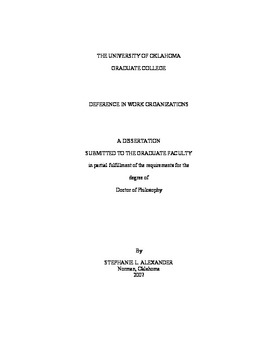| dc.contributor.advisor | St. John, Craig, | en_US |
| dc.contributor.author | Alexander, Stephanie L. | en_US |
| dc.date.accessioned | 2013-08-16T12:21:00Z | |
| dc.date.available | 2013-08-16T12:21:00Z | |
| dc.date.issued | 2007 | en_US |
| dc.identifier.uri | https://hdl.handle.net/11244/1297 | |
| dc.description.abstract | In this paper, I will look at the effects of race and the amount of deference subordinates give to their supervisors, which to my knowledge this is the first study of its type on deference in workplace organizations. If racial differences exist in employee responses toward supervisors, it is probable race continues to be a determinant of differences in the receipt of other valuable resources since human actors are not simply passive agents within organizations that control these resources. I expect to find differences in how white employees respond to minority managers in comparison to how they respond to white managers. | en_US |
| dc.description.abstract | My results indicate that race of the supervisor does have a limited effect on the amount of deference that supervisors receive from their employees, especially in social situations. In retrospect, the scales that I created to measure deference could actually be measuring friendliness or the absence of friendliness, which is also critical in studies of race in work organizations. These findings suggest that employee responses are primarily influenced by their feelings about the relationship with their supervisor. However, race does have a limited effect on employee decisions to spend time with their supervisors in intimate settings, and it affects the amount of physical and verbal distance that employees tend to keep from their supervisors. | en_US |
| dc.description.abstract | During a period in which sociologists and other scholars believe that race and class are inextricably linked it has become increasingly difficult to maintain that race continues to be a key factor in social relations, especially those involving access to valued resources. However, I argue that race continues to be a significant factor in American society. While this paper is not chiefly concerned with differentiation in relation to how resources are distributed, it does focus on possible disparities in human responses based on the race and/or ethnicity of the actor (one who carries out an action) and the recipient (the benefactor of the actor's activity). Such disparities might, ultimately, lead to deleterious outcomes for some racial and/or ethnic groups. | en_US |
| dc.format.extent | xii, 111 leaves ; | en_US |
| dc.subject | Respect. | en_US |
| dc.subject | Sociology, Industrial and Labor Relations. | en_US |
| dc.subject | Diversity in the workplace. | en_US |
| dc.subject | Personnel management. | en_US |
| dc.subject | Sociology, Ethnic and Racial Studies. | en_US |
| dc.title | Deference in work organizations. | en_US |
| dc.type | Thesis | en_US |
| dc.thesis.degree | Ph.D. | en_US |
| dc.thesis.degreeDiscipline | Department of Sociology | en_US |
| dc.note | Adviser: Craig St. John. | en_US |
| dc.note | Source: Dissertation Abstracts International, Volume: 69-01, Section: A, page: 0390. | en_US |
| ou.identifier | (UMI)AAI3291930 | en_US |
| ou.group | College of Arts and Sciences::Department of Sociology | |
